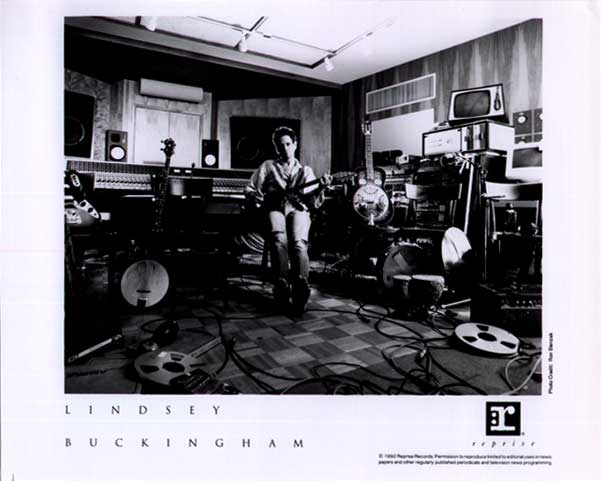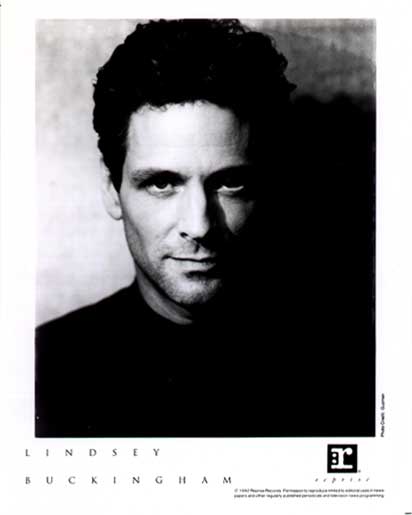It's been eight years since the release of Lindsey Buckingham's last solo album and over four years since his departure from Fleetwood Mac, the band whose world class music bore the unmistakable stamp of Lindsey's guitar, vocal and songwriting mastery.
While absent from the spotlight, Lindsey has hardly been resting on laurels. For the past three years he's been continually at work, writing, performing and, with the help of long-time collaborator Richard Dashut, producing a collection of new songs for his Reprise Records debut solo album.
The result is Out Of The Cradle. As its title suggests, these eleven new songs (along with two intriguing covers and assorted intros, outros and aural filigree) mark a distinct creative rebirth for the artist. Free to pursue his multi dimensional muse, Lindsey has fashioned an album with a wit, accessibility and spontaneity that belie its long gestation.
At the same time, the music of Out Of The Cradle, like the family snapshots that adorn its cover, reveal personal and particular aspects not only of the musician, but of the man. It is, in short, a rare glimpse into the life and times of a most mercurial individual, making some of the best music of his career.
In a recent conversation, Lindsey Buckingham talked about the recording of Out Of The Cradle, his departure from Fleetwood Mac, the personal touch and other related subjects.
Q: What was the genesis of the music on Out Of The Cradle?
Lindsey: I'd been working on solo material while I was still in
Fleetwood Mac, writing songs in between albums. In fact, some of intended for
this project, like "Big Love" and "Family Man ended up on Tango In The Night,
my last album with the band.
Q: Was the style and substance of Out Of The Cradle
effected by your leaving Fleetwood Mac?
Lindsey: Of course. Leaving was a tough decision, after all those
years, but I'd been chomping at the bit for a while. Joining a band and making
music in that framework is a lesson in adapting... individual styles become
folded into the group sound, which is fine; you've got to play ball. But you
end up putting a lot of things aside. I wanted to tap into some of those
potentials.
Q: Any potentials in particular?
Lindsey: My guitar playing for one. When you're in a group situation, the guitar becomes part of a larger arrangement. I mean, Chet Atkins used to play guitar on Everly Brothers records and you never really noticed he was there...it was just a great record. My first two solo albums, Law And Order and Go Insane, were much more Fairlight oriented. I didn't want to use that as much. I wanted to play more guitar, even at the risk of being flashy and I think this record has a little more flash to it as a result. If you've got it, flaunt it.
Q: What precipitated your leaving Fleetwood Mac?
Lindsey: Initially it was just that I really didn't want to tour. I wasn't sure at first, but as it got closer I realized that it was time for a change.
Q: What about the obligatory 'musical differences?'
Lindsey: One of the reasons Tusk came out as it did was because we had done Rumours and I got uncomfortable trying to follow up on that. In some ways I guess you could consider Tusk my first solo album. At the time, a whole new wave of things started happening that were extremely interesting to me and validated a lot of feelings about where I wanted to go. There was also this on going reaction to the phenomena of being a phenomenon. It sort of takes over from the music and that's scary. I found myself struggling not to lose my perspective.
Q: Did Out Of The Cradle help you regain it?
Lindsey: I started from scratch on this album. After leaving
the band I didn't do anything for awhile, just let the dust settle before I
eased back into work. The writing and recording all sort of happened together.
It's like painting. You may approach the canvas with an intent, but as it
takes on a life of its own, it starts giving you back some direction.
Naturally I cut a lot more than I ended up using, maybe twice as much.
There'll be a lot of 'b' sides. I recorded it in my home studio. It was pretty
monk like existence, but I liked
the solitude.
Q: Any special reason for taking that approach?
Lindsey: I took me awhile to rediscover my solo style, to cover the
ground in the way I knew I could. Initially it was suggested that different
producers do different tracks, but I wasn't comfortable with that. If I was
going to do it, I might as well just jump in all the way.
Q: How did working alone compare with the interaction of a band?
Lindsey: Doing it all yourself obviously isn't as efficient, but I
don't think I would have been confident enough to apply some of my strengths
to a group situation right away. I had to go through that process to get
hungry for musicians again. Now I think I'm ready to work with other people.
Q: So you could see yourself in a group situation again?
Lindsey: I'd need a group to do my stuff properly in concert, but I'd
like to do something like use a whole section of guitars and a full complement
of vocalists on stage.., whatever's needed to reproduce the sound.
Q: Did you have any particular approach to the music on Out Of The Cradle?
Lindsey: My music is pretty densely packed. It's part of a style I've
developed, but I think I'm backing away from that a little bit, especially as
my guitar playing covers more ground. I once read an interview with Hershfeld,
the famous illustrator, who said his best caricatures are the ones that
capture the whole personality in one continuous line. That's sort of what I'm
after, too. I like thinking visually of the various musical parts and how they
fit together. It's like a jigsaw.
Q: How did the album take shape?
Lindsey: We'd record material and things would get to a certain stage
and you'd know that maybe that one wasn't going to make it. Or you put
something in a closet and dust it off a few months later and try it again.
Richard Dashut was involved almost daily, engineering. I also engineered, but
neither of us are that technically oriented. So we recorded the way we knew
how, with virtually everything cut in mono.
Q: Were there any distinct musical reference points to the album?
Lindsey: Part of making this album was in re discovering music that
seemed to be coming into its own again. I'm thinking of people like Natalie
Cole, the great Tin Pan Ally writers or someone like Harry Connick, who's
completely bypassed R&B. There seems to be a new audience for that kind of
music, which I've always loved. So you gather things that interest you and you
put them into an equation. It's not that you want to be literal with those
reference points. My interpretation of those influences come out in songs off
the album like 'Soul Drifter' or 'Surrender The Rain.' Those are the ones my
Mom likes. 'Streets Of Dreams' is another example of taking different, older
references and trying to do something new, something weird with them. I mean,
you could hear Billie Holliday singing something of the sort.
Q: What was the notion behind the spoken intro to 'Surrender The Rain?'
Lindsey: I'm sure that's about me, trying to process some of the finer
emotional points of what I've been through recently. I look at it as trying to
expand the form. An album doesn't necessarily have to be six cuts on side one
with two second spaces between them.
Q: Is there a lyric point of view to the album?
Lindsey: When I was writing these songs they came from a very personal
world, but as they emerged I began to see that many of them could be taken in
more than one way. I'd like to leave it like that, to give people the freedom
to get whatever they can out of the songs.
Q: What was it about 'All My Sorrows' that made you want to include it on
the album?
Lindsey: 'All My Sorrows' is a true folk song that I first heard the
Kingston Trio do. I just took the basic scheme and changed the melody, the
harmonies and the chords. I was after a different feel...something along the
lines of 'The Third Man Theme.' I wanted also to give a nod to Dave Guard of
the Kingston Trio, who died last year. Again, a personal thing.
Q: Was putting on an instrumental version of 'This Nearly Was Mine' a
personal thing also?
Lindsey: I was walking the thin lounge line there. Most people wouldn't
have chosen do something like that. Or, I think, the guitar style to pull it
off. The soundtrack to South Pacific was one of the first albums I ever heard,
when I was maybe was three. It's stayed in my heart all these years. It was my
father's favourite song, so, yes, I guess it is personal. There's an element
of family to this record, with a lot of it coming from my personal history. I
think it was important for me to get that out in the open.
Q: What's your feeling about the state of popular music these days?
Lindsey: I watch MTV, so I'm in touch with the commercial side of
things, I guess. Whether I personally like it or not, I can understand why the
stuff that's popular now is out there and doing well. Aside from whatever
social and political reasons there may be for something like rap, I can see
why kids, black and white, think that it's fresh for not having melody.
There's nothing wrong with that. It's logical. I can remember driving around
my neighbourhood playing Revolver and my Mom not getting it. Your reference
points change.
Q: How does it feel to have completed a project so long in the making?
Lindsey: Great. I've spent three years relying pretty much on my own
judgement and now I think I'm ready to find out what someone else thinks about
it all.
04/92


